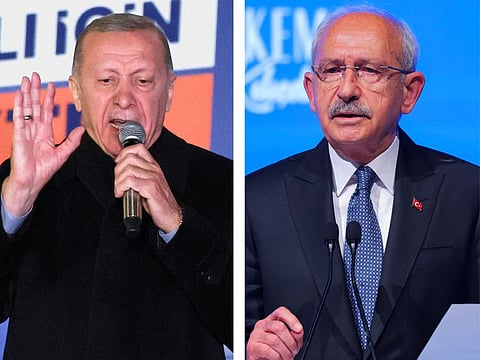What May 28 run-off election means for Erdogan and Turkey?
The country faces political crossroads as important run-offs approach, widening rifts

There is no clear winner in Sunday’s elections, held on the 100th anniversary of the Turkish Republic, forcing the nation to go for a runoff on May 28.
Neither incumbent president Recep Tayyip Erdogan nor his rival Kemal Kılıçdaroglu of the Republican People’s Party (CHP) won 50% of the vote, although the president’s Justice and Development Party (AKP) did retain its hold on the Turkish parliament.
Ten million people cast their vote on May 14: Erdogan scored 49.51%; Kılıçdaroglu 44.88%. To put that in perceptive, during the last elections in 2018, there were six presidential candidates and Erdogan won — right from the first round — 52.59% of the votes. The closest runner-up came in with 30.64 votes.
Erdogan’s main rival
Kılıçdaroglu, 74, is a retired civil servant and former academic who served on the board of Isbank bank, Turkey’s largest commercial bank. He also helped form the country’s eight Five-Year Development Plan, and in 1992, was director of the Social Insurance Institution.
But more importantly, he is a staunch secularist who accuses Erdogan of eroding Turkey’s secularism and democratic system. He has been leading the parliamentary opposition since 2010 and when addressing his supporters on Sunday, said: “We will definitely, definitely win this election in the second round. Everyone will see it.”
That might be easier said than done, however, given that Erdogan is currently ahead with more than two million votes and has swept the important cities of Ankara and Istanbul.
But it won’t be that smooth for the 69-year-old president due to a systematic campaign being launched against him by six of the main opposition parties, who have all united into a national alliance under Kılıçdaroglu’s umbrella.
United front against Erdogan
This alliance includes Kılıçdaroglu’s own party — the CHP — the Good Party, and the People’s Democratic Party (HDP) that is focused on minority rights — Kurds included. Erdogan accuses it of links to terrorist groups, which forced it to campaign this year under the banner of the Green Left.
They did exceptionally well on Sunday, winning 62 parliamentary seats and scoring major victories in 13 out of 15 Kurdish-majority provinces including the strategic city of Diyarbakir.
All the opposition parties are campaigning with a common objective of defeating Erdogan. If elected, they promise to send Syrian refugees back home, reduce presidential powers, empower the legislative branch, jump-start a decades-long bid to join the European Union, and realign relationship with the United States.
State of the economy
One of the main weapons being used against Erdogan today are his economic policies, which plunged the Turkish lira and brought inflation to a soaring 85% in 2022.
The opposition alliance is pledging to bring down inflation to below 10% by 2025, and deal with Syrian refugees who are accused of draining the treasury, and creating a chronic security problem for Turkey.
There is also much anger from the February earthquake that destroyed large parts of Turkey and claimed the lives of more than 50,000 people. The Turkish opposition accuses Erdogan of mishandling the crisis.
The eleven provinces hit worse by the earthquake were previously considered AKP strongholds. During the last two elections they voted for Erdogan. In 2023, there votes were recorded at 2-3% less than in 2018.
The Presidential System
After the failed coup in the summer of 2016, Erdogan called for a constitutional referendum that led to expanding presidential powers at the expense of the premiership, which was scrapped completely.
Turkey’s parliamentary system was replaced with an executive presidency. That referendum, held in April 2017, gave Erdogan wide-scale powers unprecedented in Turkey’s history, making him the strongest head of state since Kemal Ataturk founded the republic in 1923.
Erdogan has since woven an alliance with conservatives, traditionalists, and the religious establishment. The opposition is promising to return to the old system and dilute presidential powers. To do that, however, they would need 400 out of 600 votes in the Turkish parliament, which currently seems far-fetched since the chamber’s majority remains in the hands of the AKP.
Erdogan’s main strengths
But despite all of the above, Erdogan remains a popular leader who has been at the helm of power for twenty solid years, first as premier and since 2014 as president of Turkey.
Of the 64 million eligible to cast their vote, five million were first-time voters aged 18-22. Most of them were born during the Erdogan era and have known no other leader.
The Sinan Ogan Factor
One factor that can make or break the run-off elections is Sinan Ogan, the nationalist candidate who was voted out of the race on May 14. He did get 5.2% of the votes and is now ready to be courted, either by both Erdogan or Kılıçdaroglu, and depending on what offer he gets, will direct his voters in that direction on May 28.
This, among other factors, could be vital in determining whether or not Erdogan remains president on May 28, when Turkey goes for a run-off.
— Sami Moubayed is a historian and former Carnegie scholar. He is also author of Under the Black Flag: At the frontier of the New Jihad.
Sign up for the Daily Briefing
Get the latest news and updates straight to your inbox



